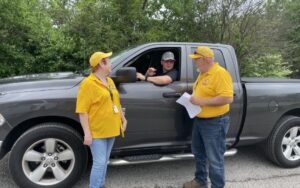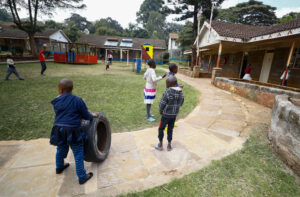
WASHINGTON (BP)–Reports of a macabre trade in the body parts of aborted babies have seized the attention of members of Congress and caused a Southern Baptist bioethicist to describe it as the “21st-century equivalent of grave robbing but worse.”
Evidence compiled clandestinely by a Texas-based pro-life organization shows some businesses are operating as agents between abortion clinics and researchers, procuring organs and other body parts from aborted children, then shipping them throughout the country to scientists who have requested them.
This trade in fetal parts, which requires whole or nearly whole bodies, explains why the partial-birth abortion procedure is defended so vociferously by abortion advocates, some pro-lifers have said.
The practice of selling fetal body parts for research is worse than grave robbing, said Ben Mitchell, a consultant for the Southern Baptist Ethics & Religious Liberty Commission. “At least the grave robbers didn’t kill their victims,” he said.
“Commodifying, commercializing and marketing aborted babies is almost too grotesque to imagine. Have we created an American research culture without a conscience?
“Science has become a new religion — researchers are the priesthood, and we are sacrificing our babies on the altar of a modern Molech,” said Mitchell, assistant professor of bioethics and contemporary culture at Trinity Evangelical Divinity School in Illinois. Molech was a pagan god to whom even some of the Israelites sacrificed their children in Old Testament times.
The U.S. House of Representatives adopted a resolution Nov. 9 calling for Congress to hold hearings and to take the necessary steps to deal with companies “involved in the trafficking of baby body parts for profit.” The resolution, though nonbinding, apparently will achieve its purpose. Hearings are expected in the House Commerce Committee next year, a congressional spokesman said.
“I applaud the Congress for calling for hearings, and I pray they will take place at the earliest possible opportunity,” said ERLC President Richard Land.
“This highly lucrative but barbaric business that is being supplied from the tiny victims of partial-birth abortion must be stopped,” Land said.
Rep. Joseph Pitts, R.-Pa., in advocating oversight hearings, said, “This is not Nazi Germany; this is the United States.
“Don’t be fooled by false choices between medical research and no medical research. We have other options other than buying and selling dead children’s body parts for research. Don’t believe the lie that medical progress hinges on this cruel commerce.”
Federal funding of fetal-tissue research has been permitted since 1993, a change brought about after President Clinton entered the White House, and there is no ban on private experimentation. Fetal-tissue transplants are promoted by some as potential treatments for Parkinson’s disease and other conditions.
The law, however, makes it illegal for a person “to knowingly acquire, receive or otherwise transfer any human fetal tissue for valuable consideration.” If private companies are found to be acting legally in their trade in aborted baby parts, Pitts and his two fellow champions of the resolution, Reps. Tom Tancredo, R.-Colo., and Chris Smith, R.-N.J., said they are eager to help “close this appalling loophole” in a letter to Commerce Committee chairman Tom Bliley, R.-Va., in late October.
The congressmen’s concerns were raised after reports of a secretive fetal-parts operation surfaced in World, a biblically based newsmagazine, and a few other outlets. The source of the information was Life Dynamics Inc., an activist pro-life organization based in Denton, Texas.
Life Dynamics began doing its own investigation in 1997 when a woman asserting she worked as a procurer of baby tissue in an abortion clinic secretly contacted the pro-life group. She continued to work undercover in a Planned Parenthood clinic and provided copies of forms from researchers requesting specific fetal tissue. LDI made available to interested news media copies of more than 50 of those orders, as well as price lists and, from one company, a brochure touting “fresh fetal tissue harvested and shipped to your specifications.”
Earlier this year, Kelly, which is not her real name, did an interview with Life Dynamics and was featured on the organization’s first issue of its video newsmagazine, “LifeTalk,” in May.
In that interview, Kelly — wearing a wig with her back to the camera and with her voice altered to conceal her identity — said she worked for an outside organization that paid a fee to the abortion clinic to enable it to send in technicians to “dissect and procure fetal tissue.” Her colleagues and she “were looking for eyes, livers, brains, thymuses, especially cardiac blood, cord blood, blood from the liver, even blood from the limbs.”
“We would get a generated list each day to tell us what tissue researchers, pharmaceutical companies, universities were looking for,” she said.
Among the order forms provided allegedly by Kelly and released by Life Dynamics were requests for:
— Five to 10 samples a month, ordered by a researcher in San Diego, from babies 15 to 24 weeks’ gestation of each of the following — kidneys, hearts, lungs, livers, spleens, pancreases, skin, smooth muscles, skeletal muscles and brains.
— Livers from children 12 to 15 weeks into pregnancy, requested by a researcher at a Massachusetts primate center, ultimately to be implanted into apes or monkeys.
— Brains from babies of eight to 24 or more weeks’ gestation sought by a doctor at a Philadelphia hospital.
— Whole legs, including entire hip joints, from babies 22 to 24 weeks’ gestation requested by a researcher at a Philadelphia university.
— Four to 10 eyes a day from children 16 to 24 weeks’ gestation for doctors at a Chicago medical school.
Upon receiving the orders, Kelly and her colleagues examined patient charts, screening out babies with sexually transmitted diseases and abnormalities in order to obtain “the most perfect specimens,” she said in the video interview. Only about 2 percent of late-term babies had abnormalities, Kelly said. While the babies they used were from seven to more than 30 weeks’ gestation, her team would see 30 to 40 babies a week of about 30 weeks’ gestation in the clinic, Kelly said.
The fetal parts would be shipped through normal routes, such as Federal Express and United Parcel Service, she said. Some researchers even provided their FedEx account numbers on their order forms. Shipments contained not only body parts but sometimes a “completely intact fetus,” Kelly said.
According to LDI, two of the businesses that provide fetal-tissue procurement and delivery are Anatomic Gift Foundation, based in Laurel, Md., and Opening Lines, until recently operating out of West Frankfort, Ill. Opening Lines fled the southern Illinois town after the local newspaper reported the nature of its business and is operating elsewhere, according to a report in World.
AGF’s price list, provided by LDI, is based on the age of the fetus and whether the tissue is fresh or frozen. For instance, fresh tissue from a baby of 13 to 24 weeks’ gestation is $90, while fresh tissue from one six to 12 weeks is $220.
Opening Lines’ prices are for specific parts or intact babies. An intact child of more than eight weeks is $600. A brain from a child of eight weeks’ or less gestation is $999. Eyes of more than eight weeks are $50, while gonads are $550. Opening Lines promotes its business through brochures touting its desire to provide, as one says, “the highest quality product prepared to your specifications and delivered when you need it.”
The companies seek to avoid breaking the law by not paying directly for fetal tissue and by not accepting money directly for it. They pay site fees to work at the abortion clinics, according to LDI. The researchers pay the companies for their retrieval costs, LDI reported.
Susan Dudley of the National Abortion Federation, which represents about 350 abortion clinics, told Baptist Press she is “aware that tissue donation goes on.” She also acknowledged AGF has exhibited at NAF meetings. As for LDI’s charges, Dudley said she would give no credence to “any information coming from Life Dynamics about anything.” She has not seen the order forms distributed by LDI, Dudley said.
LDI President Mark Crutcher told Baptist Press that Dudley was guilty of “making a blanket condemnation” about his organization without addressing whether the information it has provided is correct. He would be glad to “go on a national television debate to debate [with her] whether this is true or not,” Crutcher said.
His organization has “only released a little bit of the information we have” but will disclose more when congressional hearings are held,” said Crutcher, who is a member of a Southern Baptist church in Lewisville, Texas.
“People in the National Abortion Federation, [National Abortion and Reproductive Rights Action League] and Planned Parenthood are scared because they know we’ve got more information,” Crutcher said.
“If what we were alleging here was not true, the groups that we have named would not be running for the hills. Instead, they would be running for their lawyers. We’ve got the goods on them, and we’ve got more coming,” said Crutcher, who said LDI has other spies inside the abortion industry.
The information provided by Kelly has helped lead Crutcher and other pro-lifers to charge the fetal parts market is the reason abortion advocates defend so intensely the partial-birth abortion method.
“There is simply no other plausible explanation why a physician would intentionally create a breech delivery …. ,” Crutcher said on one of LDI’s videos. “Any way you cut it, the hidden agenda behind partial-birth abortion is the wholesaling of dead babies.”
Kelly said the abortion doctor would change the type of procedure to provide her team with the “most complete, intact specimens” when requested on order forms. Sometimes the heart might still be beating in these children, she said.
The partial-birth procedure, which is typically performed in the fifth or sixth month of pregnancy, normally involves the delivery of an intact baby feet first until only the head is left in the birth canal. The doctor pierces the base of the baby’s skull with surgical scissors, then inserts a catheter into the opening and suctions out the brain. The collapse of the skull enables easier removal of the dead child.
Sen. Robert Smith, R.-N.H., cited Kelly’s testimony and LDI’s research in speaking in support of the Partial-birth Abortion Ban before the Senate voted on the bill in October. He introduced an amendment in an attempt to close the loophole allowing trading in fetal tissue, but it failed 51-46.
The Senate adopted the Partial-birth Abortion Ban by a 63-34 vote, but it appears certain to be vetoed by President Clinton again. Twice before, the president has vetoed the ban and the Senate has failed to reach a two-thirds majority necessary to override his veto.
Kelly said she decided to tell her story to Life Dynamics after a particular case of live births. The doctors brought her twins at 24 weeks’ gestation. She would not be a part of taking their lives, Kelly told him. He drowned them by pouring sterile water into the pan that held them until the water covered their mouths and noses, she said. Kelly returned to the room and procured the tissue under protest, she said.
There were more cases of live births from 16 weeks’ gestation to 30 weeks, she said. The doctor “would either break the neck or take a pair of tongs and basically beat the fetus until it was dead,” said Kelly, who continued to work undercover for LDI until recently.














